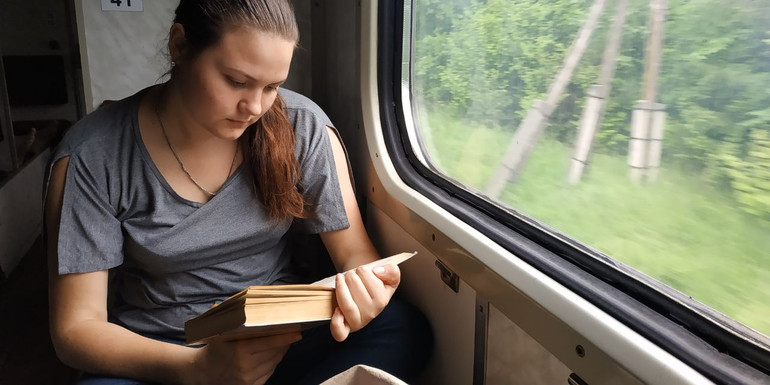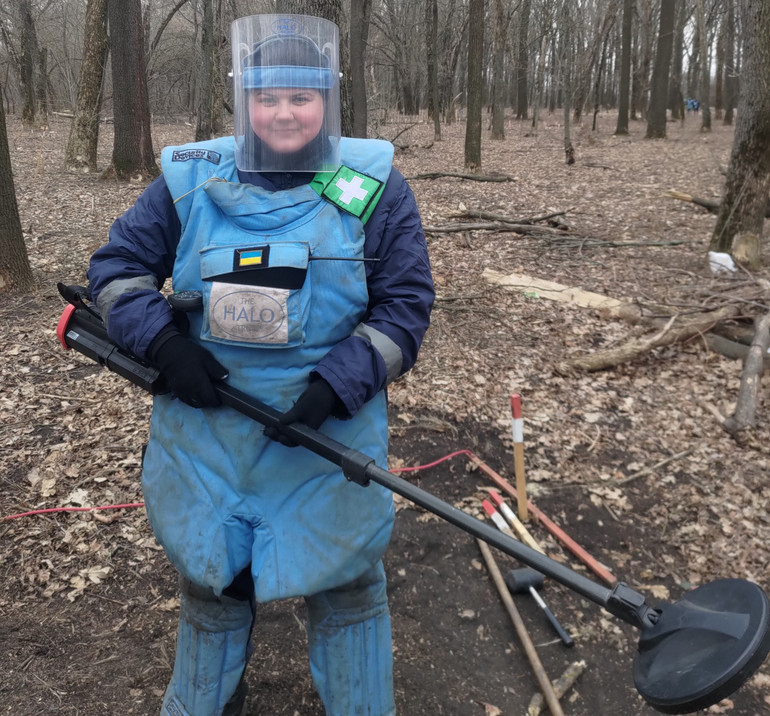What is it like to be a deminer? The story of 23-year-old Lisa
[ad_1]
“I hear a signal in the ground, then I excavate a dangerous find, … and suddenly there is an explosion. I wake up from the sound. It turns out that the dream about my work on a minefield just coincided with the real night shelling of Kharkiv.”
These are the dreams of Yelyzaveta Boriskina, a 23-year-old deminer who works at The HALO Trust – the largest international non-profit organization engaged in humanitarian demining of Ukrainian lands.
HALO has been operating in eastern Ukraine since 2015. There are 1200 people in the team, 30% are women. These are deminers and co-workers who determine where exactly there is mine pollution and where it is not. As well as colleagues who specialize in the transportation and destruction of explosive objects.
Following the Russian invasion in February 2022, The HALO Trust Ukrainian team launched a new demining operation around Kyiv to clear Ukrainian land. Currently, the mission team works in Kyiv, Chernihiv, Sumy, Kharkiv, Kherson and Mykolaiv regions.
Lisa works in the Kharkiv direction – between the settlements where the demarcation line passed. Now this area is abundantly strewn with deadly finds.
The task of Lisa and her colleagues is to clear the land of these dangerous “surprises”.
“Next to the village, flooded meadows, people will go there to mow, graze cattle… and there death is lurking on every millimeter.” – says Lisa.
“UP. Life” tells the story of the deminerka.
She came to pick up her grandmother and ended up in the occupation
The girl is a meteorologist by profession. She graduated from Kharkiv National University named after Karazin.
Before the war, Lisa worked as a meteorologist at the Kharkiv airport, and in the first days of the full-scale invasion, she went to Izyum to save her grandmother, and was stuck in the occupation for half a year.
23-year-old Lisa, who became a deminer
“When I arrived in our village of Oskil, which is near Izyum, all hopes that it would all pass quickly disappeared. A substation nearby was destroyed – the light went out. I was able to take the grandmother out, but she stopped – this is my home. And then the bridges were blown up, and we were trapped.” Lisa recalls.
The village is located in the suburbs of Izyum and is divided in half by the Oskil River. The Russians occupied the right bank in March, and fired on the city from here. Later, they captured the entire village.
There was no time to sit and cry during the occupation, – remembers Lisa. My grandmother and my mother and my brother are in the house next door. Everyone should be advised.
She rode a bicycle to nearby settlements for groceries. Friends helped with the money – they put it on the card, but to withdraw it, you had to go to an ATM that was working and pay a fee.
“The occupiers entered the territory with a manifesto of “good Russians” – they say, we will not offend you – they came to liberate… but the units of the so-called “LPR” and “DPR” – raged. Our house is quite far from the center, so we miraculously managed to escape searches and confiscation of property and food”, – says Lisa.
The girl compares the psychological state due to being in the occupation to the pressure of a hydraulic press that squeezes oil. Fear, caution and a feeling of “lack of air” because freedom has been taken away.
In order to collect, for example, water from a well, you had to go outside with your passport, always be ready to answer the question of the occupiers: “Did you wait for us? And what are your moods? Are you happy with humanitarianism?”.
“The complete information vacuum in the occupation is very scary,” – remembers Lisa.
The girl climbed the hill and tried to communicate to get news about what was happening outside the occupation.
Lisa became very friendly with the local residents. He remembers how the neighbors helped bring in and cut firewood for his grandmother.
In August, Liza managed to leave for Kharkiv. The girl joined the humanitarian mission as a volunteer and on September 24, 2022, after the deoccupation of the Izyum district, she returned to her native village with a humanitarian truck.
Since September 2022, the girl has been living in Kharkiv. She volunteered – packed humanitarian products, wrote and defended her diploma and got a job as a sales manager for household goods.
She worked because she needed money, but even then she realized that this was far from her dream job. However, he says can recommend good glasses even now, even remembers their article number.
Liza does not have her own home in Kharkiv. The owner of one hotel in the city center came to the rescue. As a student, Lisa worked here as a cleaner, and now the woman has allowed one of the rooms to be rented for a small fee.

Lisa works in the Kharkiv direction – between the settlements where the demarcation line passed
I asked to join the army – they took me as deminers
Going to the army was Lizina fix idea:
“I decided that I am a very valuable personnel, because I understand field mobile and electronic maps, I understand how drones work. I began to “storm” military commissars, even asked to be taken to the 13th brigade of the National Guard of Ukraine “Charter “but I have hypothyroidism, so my health closed my way to the army.”
All of a sudden, Lisa came across a vacancy. HALO Trust was looking for deminers. She responded and… passed the selection!
Interview and then training: theory in the office and practice in the field. At first it seemed to Lisa that some superheroes were working in the fields.
“Your incoming incompetence is covered by the competence of the trainers, who calmly and persistently invest their unique knowledge in the future deminers for 25 days”, – says Lisa.
When the time came to confess to her grandmother where she would work from now on, Lisa was nervous:
“Grandmother then said – “Oh, you’re a hit with me, Lizka”, but I know that she is very proud of me, and is secretly glad that I was not accepted into the Armed Forces.”

Specialist deminers are always in the open air, often on their knees, sometimes in the rain and in absolute concentration
How deminers work
Lisa explains that deminers work in a system of a clear algorithm. There are three types of demining: military, operational and humanitarian.
Military takes place during hostilities (for example, after the retreat of the enemy) and in de-occupied territories. Military sappers are engaged in it. Then the sappers of the State Emergency Service enter the designated areas. Operational demining is the detection and destruction of munitions. This can be done by the military, the State Emergency Service, sappers of the National Police, the State Special Service of Transport.
But humanitarian is precisely the gradual “thoughtful” demining of entire areas outside the combat zone (more than 20 km from the contact line), for example, agricultural fields, dense forests. International non-profit foundations and domestic commercial organizations are actually engaged in it.
“In the first days of work, it was not scary – just unusual, – the deminer paraphrases the beloved Zhadan. – My debut on the field is a priceless experience. You are wearing heavy armor, because you are going to anti-personnel mines. The main thing here is to listen to the manager, follow colleagues, and follow the algorithm. And look under your feet. This is painstaking and monotonous work”.
Demining is very hard physical work. Specialist deminers are always in the open air, often on their knees, sometimes in the rain and in absolute concentration.
“Everything is clear and structured with us – first, the non-technical survey department works. It determines – what is the threat in this area? Next – a demining plan is drawn up. There is a broken perimeter with work passages. Dangerous areas are marked with red and white sticks. We have special work tools, we work not for speed, but for quality” – explains the deminerka.
Getting up at 5 in the morning, leaving at 6:15 – that’s all the magic of the morning – Lisa jokes. Sleep must be of good quality in order to have strength and concentration.
The girl lives in the center of Kharkiv, which is under fire. So her life hack for anxiety, obsessive thoughts, and PTSD is great continuous fatigue.
“I just don’t have the resources for any depressive thoughts or fears. Even when I hear explosions and understand, it’s not nearby. I turn over to the other side – ok – you can sleep further, you need your 6-7 hours to “sleep”” Lisa adds.
The girl admits that the war and the occupation directed her life in a completely different direction, she simply stopped being afraid of many things, and also formulated an absolutely clear motivation for herself:
“I really want children to live their childhood lives happily, and not blow up on a stretcher or an anti-personnel mine. Today, I am stepping into a minefield for the peace of mothers and the safety of children.”
Iryna Skosar, especially for UP. Life
[ad_2]
Original Source Link











